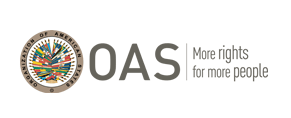

Language Section
Menu
Become a freelance interpreter
The Program to Expand the Official Roster of Freelance Translators and Interpreters of the Organization of American States (OAS) identifies qualified interpreters and translators in different countries in the region and includes them in the portfolio of professional freelancers of the Language Section of the Department of Conferences and Meetings Management, with a view to hiring them for conferences and meetings organized by the OAS away from headquarters.
The Program is carried out in collaboration with the respective member state governments, through their ministries of foreign affairs, which provide logistics for the examination process. The Language Section of the Department of Conferences and Meetings Management of the OAS reviews the résumés of candidates and invites those professionals that meet the stipulated requirements to take an interpretation exam. The Language Section reviews the exams and notifies the candidates of the results. The Director of the Department of Conferences and Meetings Management of the OAS sends to the Ministry of Foreign Affairs a list and the contact information of those professionals who pass the exams.
This process does not constitute an offer of employment.
Requirements
• At least one of the OAS official languages (Spanish, English, French, or Portuguese) as language A(*) and at least one of the other three as language B.
• At least five years’ professional experience as an international conference interpreter.
• A university degree or professional diploma in interpretation, languages, or related areas.
Procedure
Candidates must complete the
attached form and send it to
[email protected].
The OAS will review the Candidates’ credentials as part of a pre-selection process. Selected candidates selected will be notified of the place and date of the exam.
(*) Active languages
• A: The interpreter’s mother tongue (or other language spoken with exactly the same proficiency as a mother tongue), into which the interpreter works from the other languages, usually in both modes of interpretation (consecutive and simultaneous).
• B: A language which the interpreter masters perfectly without it being their mother tongue. The interpreter works into this language from their other languages, although some interpreters only work into their “B” language in one of the two interpretation modes.
Passive languages
• C: Source languages that the interpreter understands perfectly.
